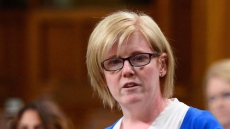OTTAWA - Canada's charities say they have begun laying off staff and shutting down their services, which are usually in high demand during economic downturns, as the sector feels the financial sting from COVID-19.
Now the almost 86,000 registered charities in Canada are looking to the federal government to help, with multiple groups calling for immediate cash injections.
Estimates from Imagine Canada, a charity that promotes the work other charities do, suggest donations will drop between $4.2 billion and $6.3 billion, and that between 117,000 and 195,000 workers could be laid off depending on the length of the COVID-19 crisis.
There was some help for the sector on Monday when the Liberals announced that charities would qualify for a 75 per cent wage subsidy to help retain workers, so long as they have seen revenues drop by one-third due to COVID-19.
But other programs in the form of loans may be more difficult to access because charities can lack collateral.
Bruce MacDonald, Imagine Canada's chief executive, says COVID-19 has laid bare all the structural flaws in the charity sector and many groups don't think they'll be able to ride out the storm.
It's why a group of some 140 charities is asking the federal government to create a $10-billion fund to help cover the expected loss of revenues — including donations, grants or other sources — from a three-month economic shutdown related to COVID-19.
MacDonald said the financial effect on the charitable sector has been almost immediate, much as it has been for restaurants.
"The challenge is in our world these have real-life consequences," he said in a telephone interview.
"If you were counting on someone to deliver your meals … this is way more challenging."
Recent years have seen a decline, overall, in donations to charities. The economic downturn linked to public health efforts to slow the spread of COVID-19 has led to the disappearance of massive pools of revenues groups rely on.
Many organizations rely on philanthropic foundations or individuals who disperse a portion of their investments. Some of those foundations and individuals now can't afford to donate because they lack surplus revenues as a result of the drop in the stock market.
Events such as galas, conferences, community-based or school-based fundraising campaigns have had to be suddenly called off, sometimes leaving groups to pay cancellation fees.
One example is the Canadian Cancer Society's annual "Daffodil Month." The April campaign usually sees 27,000 volunteers out raising funds, including going door to door. The organization's CEO says the society expects to lose out on almost $20 million over the next month, plus tens of millions more in the coming months.
"Daffodil Month is the Canadian Cancer Society's prime fundraising and awareness month, so we are very concerned about the impact of the pandemic," said CEO Andrea Seale.
"Like so many health organizations and charities, the people we serve need us more than ever because of the pandemic, but social distancing and a faltering economy makes fundraising much harder."
The envisioned $10-billion fund would be easier for charities to access than low-interest loans or repayable grants, said Samantha Nutt, founder and executive director of War Child Canada.
"It can't come soon enough because every day I know people are making really tough decisions," she said.
"The longer we delay this, the more catastrophic it will become."
Nutt said the Liberals appear open to helping out beyond what they've already done and the hope is that in coming days there may be more direct help announced.


